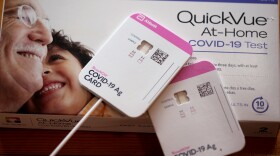COVID-19 cases and hospitalizations in the Austin area were on the decline earlier this week, but health officials say those numbers appear to be plateauing, or leveling off — a sign the community needs to redouble its efforts to slow the spread of the virus.
The five-county region is seeing an average of 55 new COVID-19 hospitalizations per day, down from a peak of 84 in mid-August. Still, that number keeps Austin in Stage 5, the highest level of Austin Public Health’s risk-based guidelines.
“We are close to that Stage 4 threshold, and we can do it again by continuing to do what we know works,” Health Authority Dr. Desmar Walkes said during a news conference Friday. “Wearing masks, getting vaccinated, staying home when we’re sick, and if we do test positive, getting in touch with a health care provider and seeing if we’re eligible for monoclonal antibody therapy.”
“We’re reaching that point where we … [are] assessing who needs to have the care first and where they need to be in order to have that care."Dr. Desmar Walkes, APH interim health authority
The number of people hospitalized for COVID-19 in the region is at 537, which is down from the all-time-high of 653 on Aug. 25. But the number of people in intensive care units continues to exceed the region’s ICU-bed capacity. Walkes said the region — which consists of Travis, Hays, Williamson, Bastrop and Caldwell counties — has an ICU capacity of 200 beds. As of Thursday, though, the region had 229 ICU patients. That's causing congestion at hospitals, Walkes said; people are being cared for in unconventional spaces and patients are waiting for care on stretchers in hallways.
Walkes said COVID-19 patients are needing to stay in the ICU longer than during previous surges because of the delta variant, which is causing more severe disease than previous variants.
Health care providers have been stretching their staff and resources to meet the demand of COVID-19 patients, the majority of whom are not vaccinated, she said. But the high number of patients means people with other health issues, like strokes and heart attacks, are having to wait to get the help they need, which can be fatal.
“We’re reaching that point where we … [are] assessing who needs to have the care first and where they need to be in order to have that care,” Walkes said.
Nine months after COVID-19 vaccines were introduced into the Austin community, health officials are continuing to implore people to get vaccinated. Just under 70% of people eligible for the vaccine in Travis County are fully vaccinated against the virus. But surrounding counties, which also rely on Austin’s hospital systems, have lower rates. (See your county’s rate here.)
Unlike at the start of the vaccine rollout, shots are now widely available — and they have been for several months. Austin Public Health hosts a number of free vaccine clinics each week. And other health care providers across the county, like pharmacies and doctor’s offices, are also offering the vaccine.
APH interim Director Adrienne Sturrup says it appears access is not the issue, though.
“It’s ideology," she said. "What are those conversations that we need to have with our community to make sure they feel confident about accepting the vaccine?”
The reasons why people are not getting vaccinated are broad, says Cassandra DeLeon, APH’s chief administrative officer for disease prevention and health promotion. She said the groups lagging behind most are children ages 12 to 15 and the working population. She said 56% of people ages 12 to 15 are fully vaccinated, and only 50% of people ages 16 to 64 are fully vaccinated.
“Those that are in the workspace trying to decide whether or not to get the vaccine, this is the time,” DeLeon said. “That is the population that is moving around the most in our community, that are going to events, that are the working population. ... If we can get those populations vaccinated, we can definitely add more layers of protection.”
To find a vaccine, go here. For a list of APH's free clinics this weekend, go here.
Got a tip? Email Marisa Charpentier at mcharpentier@kut.org. Follow her on Twitter @marisacharp.
If you found the reporting above valuable, please consider making a donation to support it. Your gift pays for everything you find on KUT.org. Thanks for donating today.









